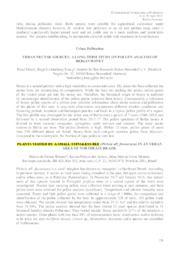Plants visited by a small stingless bee (Plebeia aff. flavocincta) in an urban area of Northeast Brazil.
Plants visited by a small stingless bee (Plebeia aff. flavocincta) in an urban area of Northeast Brazil.
Author(s): RIBEIRO, M. de F.; SANTOS, K. P.; MARIANO, A. M. C.
Summary: Plebeia aff. flavocincta is a small stingless bee known as ?mosquito? in Northeast Brazil. According to previous surveys, it occurs in rural areas (being abundant in the past, but quite scarce nowadays) and in urban areas, as in Petrolina (Pernambuco). In December 2017 and January 2018, two natural nests of this species located in Prosophis juliflora trees at a central square of the town were investigated. Worker bees carrying pollen were collected when arriving at nest entrance, and their pollen loads were obtained for pollen analysis (acetolysis). Temperature and relative humidity were measured. Plants and their pollen grains were collected in a range of 1.000m, for comparison and identification of the pollen collected by the bees. In approximately 12h of work, 388 pollen loads were obtained. The results showed that temperature varied from 25-31.1oC and the relative humidity from 26-56%. The pollen analysis showed that the bees visited 22 plant species distributed in 11 botanical families (mostly Fabaceae). They visited mainly Senna spectabilis (57% of the samples), a native species. Other plants with less than 10% of representation were: Azadirachta indica (referred to be toxic for Apis mellifera larvae), Croton sp., Momordica charantia and a species not identified of Verbenaceae.
Publication year: 2018
Types of publication: Abstract in annals or event proceedings
Unit: Embrapa Semi-arid Region
Observation
Some of Embrapa's publications are published as ePub files. To read them, use or download one of the following free software options to your computer or mobile device. Android: Google Play Books; IOS: iBooks; Windows and Linux: Calibre.
Access other publications
Access the Agricultural Research Database (BDPA) to consult Embrapa's full library collection and records.
Visit Embrapa Bookstore to purchase books and other publications sold by Embrapa.

